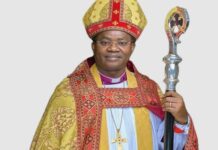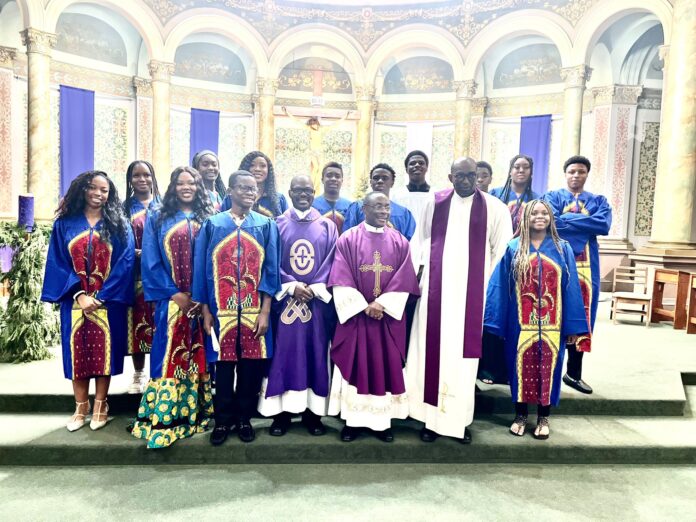The Nigerian Igbo Catholic Community of the Diocese of Oakland celebrated its 20th anniversary on Sunday with a vibrant Mass and cultural festival, honouring two decades of spiritual growth and community service that has transformed the East Bay.
They live and celebrate their Catholic faith through the beautifully-unique lens of their culture, yet their journey reflects the same one countless Catholics have made to America over the centuries, finding God as their center while preserving their heritage in a new land. The Nigeria Igbo Catholic Community, one that has held strong to its faith as the center of a vibrant culture interwoven into life in the Bay Area
“The members of the Oakland Diocese, who were of the Igbo descent, were eager to be able to pray to God in their vernacular,” said Father Alfred Amos, the community’s chaplain.
“There was already an existing community in San Francisco, but because of the distance and so many other things, it was difficult for them. They still were going to San Francisco until God sent a priest, Father Athanasius Abonoyo, who happened to come to the Oakland Diocese.”
He said that Father Abonoyo rallied people of Igbo descent from within the Diocese, reaching out at everything from funerals to football games. With an established community, he went to Sister Felicia Sarati, CSJ, who was the Director of Ethnic Ministries for the Oakland Diocese, to officially create the association.
“The Diocese of Oakland gave us the ability and opportunity to be able to praise God in the language that he gave us. And using the culture that he gave us, it makes each and every one of us fulfilled.”
Father Amos and other members of their community estimate that the Igbo community in Nigeria is about two-thirds Catholic, and deeply make Christ the heart of their collective life.
“We are so religious that God is the center,” said Father Amos.
“Even before missionaries came, God had always been the center of our ecosystem, not just the human environment, but everything about our environment “ “The Igbos have always been very spiritual. Long before Christianity came, we had certain words like ‘Chi.’ Chi means the essence, the spirit of who you are,” said NICC President Austin Uwakwe.
“When we embraced Christianity, we brought that same religious zeal with us into the faith.”
Other NICC leaders share how, as it has been for so many Catholic immigrant communities from Ireland in the late 19th century to southern Europe, Latin America and Asia in the 20th century, the Igbo community has infused its culture through multiple overlapping avenues of life in cultural, professional and social circles, but each extension reaches back to Christ and the Catholic faith as the point of overlap.
“When you come to our community, you see people from different states, but the common ground that brings us together is this Igbo Catholic community, worshiping God in our language,” said Director of Liturgy Ugo Ubili.
He and other NICC leaders describe the Mass experience as an environment that is far from sedate, but a passion-filled celebration of God’s presence.
“We worship God with all our beings,” said Father Amos.
“There is joy, there is singing, there is dancing, there is prayer. Everything is combined together. It’s not a calm environment. It is always a heated environment with every energy to worship this God who gives us life.”
“One of the things that moves (visitors) is the joy of how we sing. We don’t just stand still and sing. You have the musical instruments. You have the drums. You have different instruments. They’re singing and they’re dancing. There’s a spiritual aspect to that,” said NICC President Austin Uwakwe.
“When you have folks who are not used to that type of Mass. It does something to them. There’s something spiritual that just comes out, and some of them can’t even explain the feeling, but they know what that feeling is.”
The same Holy Spirit manifesting itself at an Igbo Mass has also helped infuse itself through the strength of community-building and network that has been constructed over 20 years in the East Bay, whether it’s a women’s group in the association that asks how to help those in need or a professional group that connects business owners or job seekers.
“It’s very difficult to differentiate the spiritual aspect from the mundane aspect. Everything is interwoven in our culture,” said Father Amos. “That’s why I said God is at the center of our ecosystem.”
The Igbo Catholic community also shares a powerful example of coming together when people are in the most visceral of needs or encountering the greatest reason for celebration.
“When you’ve been around for about 20 years, people lose family members. People get married, people have babies. So we created this support system,” said Uwakwe.
“If somebody loses a parent, the community rallies. Financially, we help out. If there’s a marriage, the community comes together. Childbirth, the community comes together. So whether it’s something sorrowful or joyful, you have a community behind you.”
That manifestation of the Holy Spirit draws from the center, and has now grown into its own Catholic ecosystem in the East Bay, one that NICC leaders pray the next generation will continue and expand.
“The children that are being born here of Igbo descent. Would they be able to carry this on as this generation moves? That’s our biggest target,” said Uwakwe.
“We have a young, vibrant community that’s still doing the Igbo masses as we keep growing.”
The celebration concluded with traditional Igbo music, dance, and a reception featuring jollof rice and pounded yam, underscoring the community’s successful fusion of African heritage with American Catholic life.





